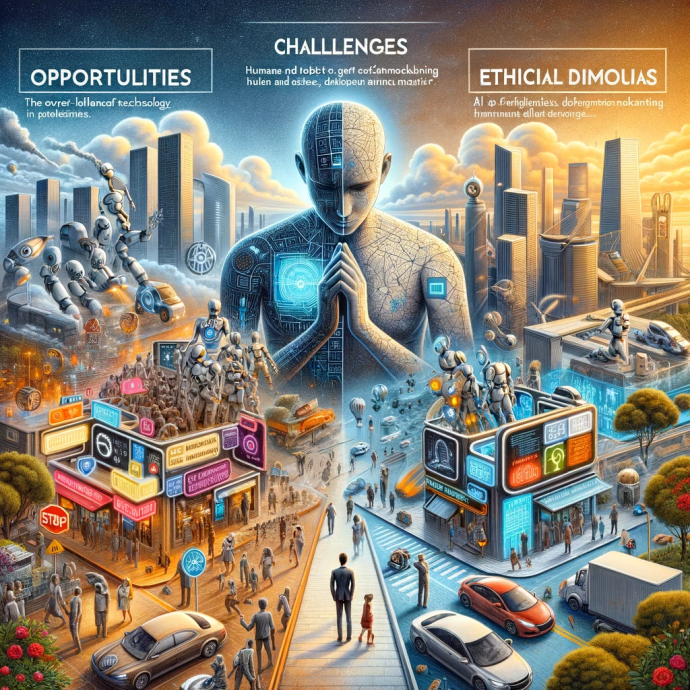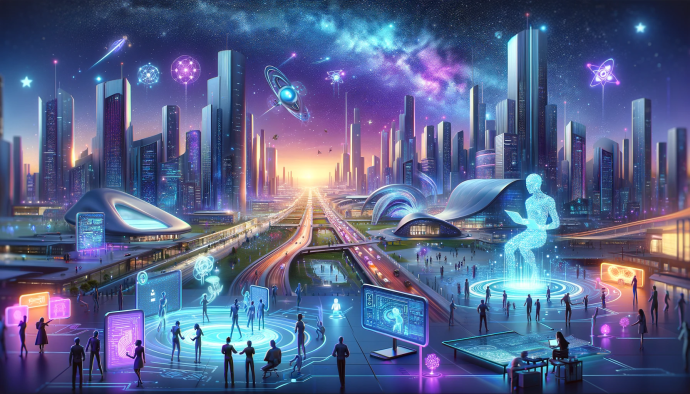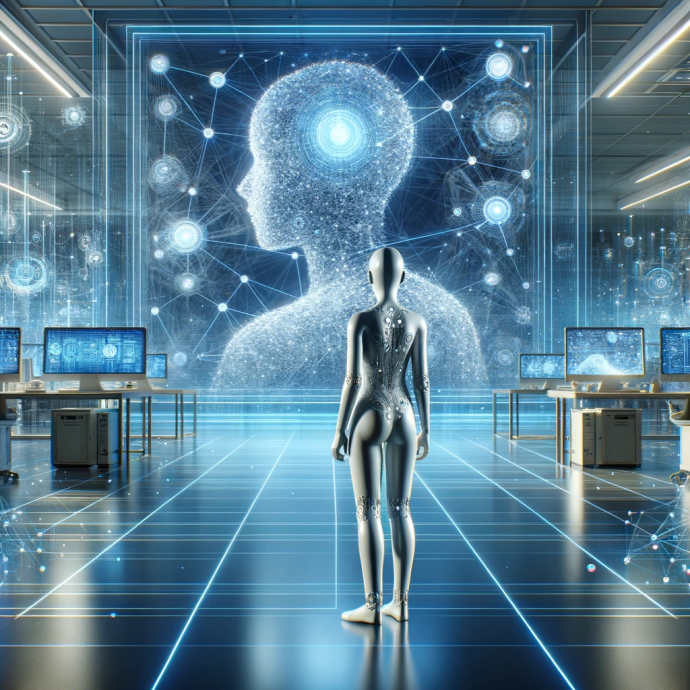Opportunities, Challenges and Ethical Dilemmas of Artificial Intelligence

The horizon of artificial intelligence (AI) stretches far and wide, encompassing a future brimming with untapped potential yet riddled with complex challenges and moral quandaries. As we stand on the precipice of this technological evolution, it's crucial to delve into the myriad facets of AI's journey — from the immediate advancements we're witnessing today to the profound transformations expected in the distant future.
The Immediate Future of AI: A Symphony of Opportunities and Skills

In the near term, AI is akin to a blossoming flower, revealing new layers of capabilities and applications. We see generative AI systems like ChatGPT and Bing morphing from mere conversational tools into sophisticated entities capable of crafting poetry, generating code, and engaging in nuanced discussions. The term «chatbot» only scratches the surface of their potential.
Microsoft and Google are not just dipping their toes but diving headfirst into integrating these AI technologies into their products. Imagine the convenience of drafting emails effortlessly, summarizing meetings with a click, and witnessing a multitude of other «cool tricks» that enhance our daily digital experiences. This is not a distant dream but an imminent reality.
Furthermore, OpenAI’s API serves as a bridge for other tech companies to harness the power of GPT-4, integrating it into their applications and products. This collaboration has led to innovative plug-ins from companies like Instacart, Expedia, and Wolfram Alpha, significantly expanding ChatGPT’s capabilities.
Medium-Term AI Prospects: A Balancing Act of Productivity and Replacement

As we look a bit further, the medium-term prospects of AI present a dichotomy of enhancing productivity and potentially replacing certain job roles. Experts like Zachary Lipton from Carnegie Mellon University highlight the impact of AI on tasks that are repetitive and formulaic. For some, this means liberation from mundane tasks, while for others, it poses a threat to their specialization in these areas.
In fields like legal and medical, AI's prowess is already making waves. For instance, GPT-4's capability to pass the bar exam or PricewaterhouseCoopers’ plans to deploy an AI-powered legal chatbot illustrates significant strides in AI's application. At the same time, the advent of systems capable of generating images and videos from simple descriptions, or bots that navigate websites and software like a human, opens up new realms of possibilities.
Long-Term AI: The Quest for Artificial General Intelligence (AGI)
Looking far into the future, companies like OpenAI and DeepMind envision the creation of Artificial General Intelligence (AGI) — a machine that mirrors the human brain in its functionality. This ambitious goal, once a topic of science fiction, is slowly inching towards reality. However, the journey to AGI is fraught with challenges, requiring breakthroughs that extend beyond our current understanding and methodologies.
The Risks and Ethical Dilemmas of AI
With great power comes great responsibility, and AI is no exception. The technologies being developed hold the promise of enhancing our lives, but they also carry risks and ethical concerns. The alignment of AI with human values and goals is a pressing issue, highlighted by instances where AI systems demonstrated unexpected and potentially harmful behaviors.
OpenAI’s proactive measures, such as subjecting GPT-4 to external testing for dangerous uses, are steps in the right direction. Yet, the unpredictability of AI systems and their learning from vast data sets mean that completely eliminating potential misuses is a Herculean task.
Regulatory Challenges and the Need for International Oversight
The path to safely harnessing AI's potential lies in robust, far-reaching oversight. However, the pace of AI development and its global nature pose significant challenges to regulatory frameworks. The call for an international regulatory system, echoed by experts like Aviv Ovadya from Harvard's Berkman Klein Center, underscores the urgency and complexity of this task.
Your Role in Shaping AI's Future

As we grapple with these questions and scenarios, it's not just a matter of passive observation. You have the unique opportunity to engage with AI, to question it, and to shape its trajectory. For your assignment, engage with AI tools like ChatGPT or Bing as you would with a budding professional. Ask them where they see themselves in 10 years and share these insights, fostering a dialogue that bridges human curiosity with AI's evolving narrative.
The future of AI is a mosaic of opportunities, challenges, and ethical considerations. It's a journey we embark on together, navigating the waves of technological advancement while anchoring ourselves in the principles of responsibility and foresight. As we delve deeper into AI's potential, let's remember that it's not just about the technology, but how we choose to integrate it into the tapestry of our society and lives.

Become a part of digital history




Comments about Opportunities, Challenges and Ethical Dilemmas of Artificial Intelligence